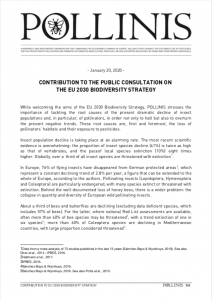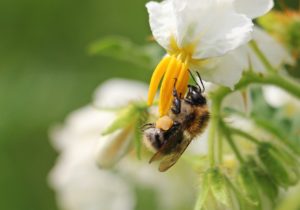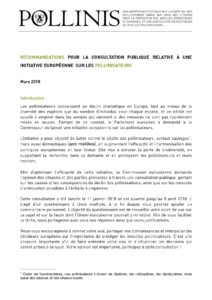Pesticides
Consultation sur la stratégie de l’UE sur la biodiversité à l’horizon 2030
La contribution de POLLINIS à la Consultation publique sur la stratégie de l'Europe sur la biodiversité à l'horizon 2030 insiste sur les principales causes de la disparition des insectes pollinisateurs : les pesticides et la disparition des habitats liés aux pratiques agricoles. (Document en anglais).
- Extrait (en anglais)
(…) Thus, in order to preserve pollinators and the whole ecosystem in which insects are the structural and functional base, the 2030 EU biodiversity strategy must focus, as key priorities, on the transition to diversifed agroecological systems and the phasing out of the use of synthetic pesticides and fertilisers, including EU-wide binding reduction targets on pesticide use.
Without the clear objective of a paradigmatic shift in agricultural practices, leading to a pollinator-friendly and sustainable food system, based on the diversifcation of farms and farming landscapes, the replacement of chemical inputs, the optimisation of biodiversity and of the interactions between different species (i.e. ‘diversifed agroecological systems’), it is likely that the future strategy will fail, as did the two preceding ones.
This ambitious objective must be achieved through a cross-sector approach, in which the 2030 EU biodiversity strategy is interwoven with the different EU policies that affect food production and mainstreamed in the relevant EU regulations, to ensure ambitious and enforceable legal measures and binding targets.
In this perspective, sectoral policies should be realigned with the biodiversity strategy goals: especially the future CAP must ensure consistency of farm practices with biodiversity conservation and the preservation of wild pollinator populations. The strengthening of systemic agri-environment measures (AEM) and the transition to organic farming need to be a priority of the next CAP.
(…)
LIRE LE DOCUMENT



